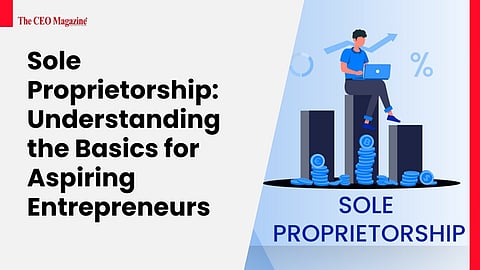
- News
- Women
- Magazine
- IndustryIndustry
- InsightsInsights
- Success Stories
- PublishPublish
- ContactContact
- Media KitMedia Kit

Sole Proprietorship: Understanding the Basics for Aspiring Entrepreneurs
A sole proprietorship is one of the simplest and most common forms of business ownership. It’s a popular choice for many small business owners and entrepreneurs who want to maintain full control over their business operations. In this article, we’ll delve into the key aspects of a sole proprietorship, including its benefits, potential drawbacks, legal requirements, and whether it’s the right business structure for you.
A sole proprietorship is a business owned and operated by a single individual. In this business structure, there’s no legal distinction between the owner and the business entity. The owner is entitled to all profits and is responsible for all liabilities and debts.
This form of business is easy to establish, requiring minimal formalities compared to other business structures such as LLCs or corporations. Sole proprietorships are common among freelancers, independent contractors, and small local businesses.
Easy to Establish One of the primary benefits of a sole proprietorship is the ease of starting. In most cases, there’s no need for formal registration or legal documents beyond obtaining necessary licenses or permits based on your industry or location. This makes it an attractive option for small business owners who want to get up and running quickly.
Full Control As the sole proprietor, you have complete control over every aspect of your business. You’re free to make decisions without consulting partners, shareholders, or a board of directors. This can lead to faster decision-making and the ability to shape your business exactly the way you envision it.
Tax Benefits Sole proprietors benefit from simplified tax processes. The business’s income is reported on the owner’s personal tax return, avoiding the need for separate corporate tax filings. Additionally, sole proprietors can deduct various business expenses, reducing taxable income.
Low Cost Compared to other business structures, sole proprietorships involve low setup and maintenance costs. There are no incorporation fees or ongoing compliance requirements, making this structure a cost-effective option for new and small-scale entrepreneurs.
Unlimited Liability One of the significant downsides of a sole proprietorship is the concept of unlimited liability. Since there’s no legal distinction between the owner and the business, the owner is personally responsible for all business debts. This means that personal assets, such as your home or savings, could be at risk if the business faces financial difficulties.
Difficulty Raising Capital Sole proprietorships often face challenges when it comes to raising funds. Since there’s no distinction between personal and business finances, investors may be hesitant to invest in the business. Additionally, sole proprietorships have limited access to business loans and lines of credit compared to larger business structures.
Limited Lifespan A sole proprietorship lacks continuity. The business is directly tied to the owner, so in the event of the owner’s death or decision to close the business, the sole proprietorship ceases to exist. This can make it harder to transfer or sell the business.
Heavy Workload Being a sole proprietor means that all responsibilities fall on one person. This can lead to a heavy workload, as the owner is responsible for everything from day-to-day operations to marketing and financial management. Without a team to share the burden, this can quickly lead to burnout.
Starting a sole proprietorship is relatively straightforward, but there are still some legal considerations to be aware of. Here’s what you need to do:
Choose a Business Name Many sole proprietors operate under their own names, but you may also choose a business name. If you do, ensure that the name is unique and not already in use. You may also need to register a "Doing Business As" (DBA) name with your local government.
Obtain Necessary Licenses and Permits Depending on your industry and location, you may need specific licenses or permits to operate legally. Research local, state, and federal requirements to ensure you comply with regulations.
Open a Separate Business Bank Account While not legally required, opening a separate business bank account is highly recommended. This helps keep your business and personal finances separate, making it easier to track expenses and file taxes.
Pay Self-Employment Taxes As a sole proprietor, you’re responsible for paying self-employment taxes, which cover Social Security and Medicare. This can come as a surprise to new business owners, so it’s important to budget for these payments and make quarterly tax payments if necessary.
A sole proprietorship is ideal for individuals who want to maintain complete control over their business and are comfortable assuming personal liability. It’s especially suited for freelancers, consultants, and small business owners with relatively low risk.
However, if you plan to scale your business, bring on investors, or minimize personal risk, you may want to explore other business structures, such as an LLC or corporation, that offer more protection and flexibility.
A sole proprietorship offers simplicity, control, and ease of management for small business owners and entrepreneurs. However, it also comes with certain risks, particularly the issue of unlimited liability. Understanding the pros and cons, along with the legal obligations, will help you determine whether a sole proprietorship is the best choice for your business.
Follow us on Google News
